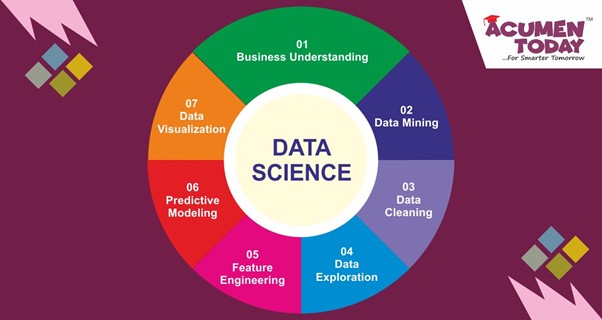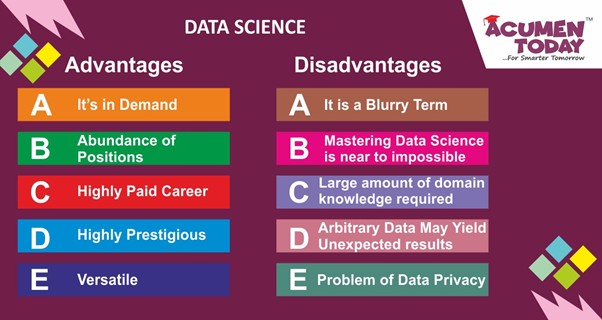
Data Science – Get Skilled or get killed!
- admin
- November 23, 2020
Data Science
When we think of data science, we must agree that it is a very broad term that cannot not be stated in a couple of sentences and none should attempt to do so either!
Data science starts with an eye for data and ends with the insight about data; and the insights are innumerable depending on whether we go deep down or go wide spread.
Data science is the field that uses scientific methods, processes and different algorithms to extract and analyse the data from different databases, data sources and data structures.
In some other ways, data science is also related to data mining, big data, and Machine learning.
So basically, data science is a very broad spectrum that includes many different subdivisions like data extraction, data analysis, data representation, data transformation, data visualization, data presentation, predictive analysis, and machine learning.

Learning data science is not difficult and at the same time, it is also not so easy.
Learning data science and to become a data science expert also needs some basic skills to be developed.
We will discuss the 10 most important skills that are needed to become a data scientist.

Mathematics and Statistics Skills
Statistics and Probability
Statistics and probabilities are basically used to represent or visualize the data in a good manner so that it could be understood easily. Concepts in statistics and probability are as follows:
- Mean
- Median
- Mode
- Standard deviation/variance
- Correlation coefficient and the covariance matrix
- Probability distributions (Binomial, Poisson, Normal)
- P-value
- MSE (mean square error)
- R2 Score
- Baye’s Theorem (Precision, Recall, Positive Predictive Value, Negative Predictive Value, Confusion Matrix, ROC Curve)
- A/B Testing
- Monte Carlo Simulation
Multivariable Calculus
Multi-Variable Calculus is important to create a machine learning model. Multi-Variable Calculus is related to the functions of multiple variables.
The regular operations involved in the multivariable calculus are:
- Limits and Continuity
- Partial Differentiation
- Multiple Integration
Linear Algebra
One should understand Linear Algebra because it is an important math skill in machine learning. Linear algebra is mostly used in science projects and engineering projects.
Linear Algebra topics need to know-
- a) Vectors
- b) Matrices
- c) Transpose of a matrix
- d) The inverse of a matrix
- e) The determinant of a matrix
- f) Dot product
- g) Eigenvalues
- h) Eigenvectors
Optimization Methods
Optimization methods are used to obtain an optimal or near-optimal solution with less computing.
Here are the topics you need to be familiar with:
- a) Cost function/Objective function
- b) Likelihood function
- c) Error function
- d) Gradient Descent Algorithm and its variants (e.g., Stochastic Gradient Descent Algorithm)
Essential Programming Skills
Programming skills like R and Python are important in data science. Also, the database query language like SQL has got importance.
Skills in Python
Understand the basic skills in Python like Numpy, Pandas, Matplotlib, Seaborn, Scikit-learn, PyTorch.
Skills in R
Know the basic skills in R like Tidyverse, Dplyr, Ggplot2, Caret, Stringr.
Skills in Other Programming Languages
Skills development in other programming languages like Excel, Tableau, Hadoop, and Spark are also important.
Data Wrangling and Preprocessing Skills
Data Wrangling
Data wrangling is one of the critical steps for any data scientist. In very few projects data becomes easily accessible. Most of the time data is in the file or database or hidden in the data published online. One should understand the proper data wrangling and clean data will make data analysis easy.
Data Preprocessing
Data pre-processing skills include:
- a) Handling Missing data
- b) Data Imputation
- c) Handling categorical data
- d) Encoding class labels for classification problems
- e) Techniques of feature transformation and dimensionality reduction, such as Principal Component Analysis (PCA) and Linear Discriminant Analysis (LDA).
Data Visualization Skills
Data Component:
Data Component is nothing but understanding the type of data. Whether it is categorical data, discrete data, continuous data, time-series data, etc
Geometric Component:
This is the skill of deciding what kind of visualization is suitable for your data. For example- scatter plot, line graphs, bar plots, histograms, Q-Q plots, smooth densities, boxplots, pair plots, heatmaps, etc.
Mapping Component:
With this skill, one can decide which variable should be considered as X-variable and which should be considered as Y-variable
Scale Component:
Here we decide which scale to use, like a linear scale, log scale, etc.
Labels Component:
This is related to Axes labels, titles, legends, font size to use, etc
Ethical Component:
This is where you must ensure that the information you are delivering is true in different aspects. We must make sure that we are not using data visualization to manipulate the audience.
Basic Machine Learning Skills
Data science and machine learning are both exceptionally mainstream trendy expressions today. These two terms are regularly tossed around together yet ought not to be confused with equivalent words. Despite the fact that data science incorporates machine learning, it is a tremendous field with various instruments.
Supervised Learning (Continuous Variable Prediction)
- Basic regression
- Multi regression analysis
- Regularized regression
Supervised Learning (Discrete Variable Prediction)
- Logistic Regression Classifier
- Support Vector Machine Classifier
- K-nearest neighbor (KNN) Classifier
- Decision Tree Classifier
- Random Forest Classifier
Unsupervised Learning
- KMeans clustering algorithm

Skills from Real World Capstone Data Science Projects
Just accomplishing a data science course is not enough to become a data scientist. Skills gains by just completing an academic course in data science are not enough. A qualified data scientist must go through a real-world successful data science project. And the project must go through every stage of data science & machine learning, like framing, data acquisition, data analysis, model building and testing, and deployment. One can get real-time projects in Kaggle projects, internships, and interviews.
Communication Skills in Data Science
Communication skills also play key role in data science projects. Data scientist must be capable of communicating their ideas with their team members and business administrators. Good communication skills helps maintaining harmony and inseparability in team ad team member like data analysts, data engineers, field engineers, etc.
Data Science – Be a Lifetime Learner
Data science is a field that is ever-advancing, so be set up to grasp and learn new advances. One approach to stay in contact with improvements in the field is to connect with other data scientists. A few stages that advance systems administration are LinkedIn, GitHub, and Medium (Towards Data Science and Towards AI distributions). The stages are helpful for modern data about late advancements in the field.
Team Player Skills in Data Science
As a data scientist, you will be working in a team of data investigators, engineers, supervisors, so you need great relational abilities. You should be a decent audience, as well, particularly during early task advancement stages where you have to depend on engineers or other staff to have the option to plan and casing a decent data science venture. Being a decent team player will assist you with flourishing in a business climate and keep up great associations with different colleagues well as heads or overseers of your association.
Ethical Skills in Data Science
Comprehend the ramifications of your undertaking. Be honest to yourself. Abstain from controlling data or utilizing a technique that will purposefully create predisposition in results. Be moral in all stages, from data assortment and investigation to show building, examination, testing, and application. Try not to manufacture results to delude or controlling your crowd. Be moral in the manner you decipher the discoveries from your data science venture.

Read more: